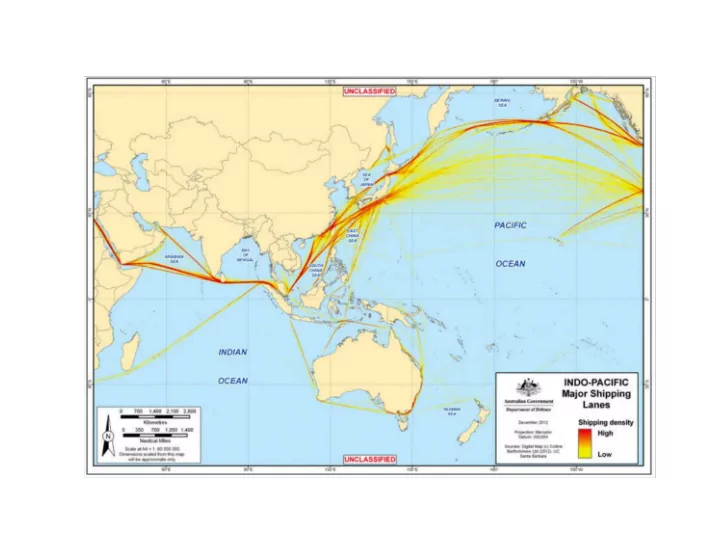

Political Warfare …the use of a wide range of the instruments of national power in efforts to persuade, intimidate, coerce, undermine, and weaken adversaries, and achieve desired political goals.
Political Warfare in the Indo- Pacific • Information campaign • Geo-strategic action • Economic means • Military/Para-military operations • Legal or para-legal means
Information Campaign • Cyber operations • Manipulation of all forms of media • Deliberate dissemination of misinformation and disinformation • Propaganda to justify actions • Mobilisation and demonstration by nationals living or studying abroad • Espionage
Geo-Strategic Action • Occupation and militarisation of disputed territory • Incursions into exclusive economic zones • Overflight of sensitive areas or assets • Harassment of fishing fleets • Coercion by paramilitary forces
South China Sea
Economic Means • Financial inducements • Non-commercial financing • Corruption of foreign political leaders and officials • Theft of technology and Intellectual Property • Artificial trade barriers and embargoes
One (land) belt one (maritime) road Source : OECD research from multiple sources, including: HKTDC, MERICS, Belt and Road Center, Foreign Policy, The Diplomat, Silk Routes, State Council Information Office of the People’s Republic of China, WWF Hong Kong (China).
Military & Para-Military Operations • Demonstrating capability in or close to sensitive and disputed areas • Testing offensive weapons • Training exercises in proximity to sensitive areas or deployed forces • ‘Buzzing’ military assets in international waters or airspace
Legal & Para-Legal Means • Rewriting history • Disputing or ignoring international law • Unwarranted claims for international rights • False claims to territory
The Nine-Dash Line
Interference and Influence Operations • Democratic political processes • Subversion and corruption of political parties, politicians and political candidates • Social media campaigns • Dissemination of misinformation and disinformation • Freedom of speech and association • United Front Works Department • Donations to universities • Mobilisation of students • Confucius Institutes and Classrooms
Reasons for China’s Behaviour • Ideology • Authoritarian state with tight political control • Socialism with Chinese characteristics • Xi Jinping thought • Nationalism • Hundred years of humiliation • Rejuvenation of the Chinese nation • Sino-centric domination of the Indo-Pacific • Economic Development and Performance • Social contract with the Chinese people • Legitimacy and survival of the regime
Geo-Economic Environment • Rules-Based Order versus State Capitalism and Mercantilism • Problems for the Chinese Economy • Slowing growth and structural weakness • Internal debt and foreign currency reserves • Adverse demographics • Possible responses • Artificial stimulation of the economy • Reduce the pension burden • Danger of bi-furcation of global economic systems
Conclusions • Recognise the threat of political warfare against our nations • We can deal with most of the perturbations in the regional security landscape • Interference operations pose the greatest threat • Decline in China’s economy will slow its military build-up • China will be less inclined to directly confront the US and will revert to political warfare • We must win this struggle
Recommend
More recommend